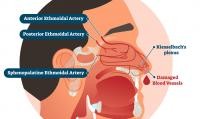Nosebleeds, medically known as epistaxis, are a common occurrence, affecting most adults at some point in their lives. While typically isolated incidents, some individuals experience frequent, random nosebleeds, significantly impacting their quality of life. This article explores the causes, symptoms, and treatment options for recurring nosebleeds.
What Causes Frequent Nosebleeds?
The primary source of most nosebleeds is the Kiesselbach’s plexus, a network of blood vessels located in the front of the nasal septum.
Several factors can contribute to nosebleeds originating from this area:
Dry Air and Turbulent Airflow
Dry air, especially during colder months, can irritate and dry out the nasal lining, making it prone to bleeding. Turbulent airflow within the nasal passages, often associated with a deviated septum, can also cause trauma to the mucous membranes covering the Kiesselbach’s plexus.
Medications and Medical Conditions
Certain medications, such as aspirin and anticoagulants (blood thinners), can increase the risk of nosebleeds by interfering with blood clotting. Underlying medical conditions, including hereditary hemorrhagic telangiectasia (HHT), a genetic disorder characterized by abnormal blood vessel formation, can lead to severe and frequent nosebleeds. Rarely, nasal tumors can also contribute to bleeding.
Nose Picking in Children
In children, the most common cause of nosebleeds is digital trauma, simply put – nose picking. The Kiesselbach’s plexus is easily accessible to small fingers, making it susceptible to injury.
When Should I See a Doctor?
While occasional nosebleeds are generally not cause for concern, frequent or heavy bleeding warrants medical attention. Consult an ear, nose, and throat (ENT) specialist if:
- Nosebleeds disrupt your daily life.
- You lose a significant amount of blood (enough to fill a cup).
- Bleeding persists for more than 10-20 minutes despite applying pressure.
- You experience dizziness, weakness, or shortness of breath along with the nosebleed.
Treatment Options for Recurrent Nosebleeds
Treatment for recurrent nosebleeds depends on the underlying cause and severity.
Home Remedies
For mild cases, simple home remedies can provide relief:
- Moisturizing: Applying nasal saline gel spray or petroleum jelly inside the nostrils can help keep the nasal lining moist and prevent dryness.
- Humidification: Using a humidifier, especially during dry seasons, can add moisture to the air and prevent nasal irritation.
Medical Interventions
If home remedies are ineffective, medical interventions may be necessary:
- Silver Nitrate Cauterization: This procedure involves applying silver nitrate to the bleeding blood vessels, causing them to scar and close off. It’s a quick and effective in-office procedure that provides long-term relief.
- Other Procedures: In more severe cases, other procedures like nasal packing, surgical ligation (tying off blood vessels), or embolization (blocking blood vessels) may be required.
Conclusion
Understanding the potential causes of random nosebleeds can help individuals take appropriate measures to prevent and manage them. While most nosebleeds are benign and self-limiting, frequent or severe bleeding requires medical evaluation. Consulting with an ENT specialist can help identify the underlying cause and determine the most effective treatment strategy to alleviate symptoms and improve quality of life.

